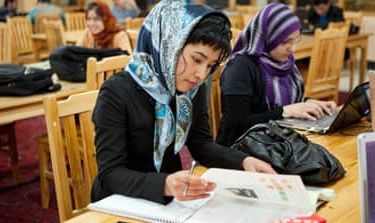In Afghanistan, terrorism can’t win over tolerance
AUAF and institutions like it are at the forefront of the war on terror, fighting theoretical foundations of extremism.

“Death is a fact of life, but we can’t stop living because we might die someday”, Jamshid Zafar, a student who was killed in the August 24 attack at the American University of Afghanistan had written on his Facebook page. He continued living not realising that “someday” would arrive so soon, or so brutally.
For 15 years the targets of terrorist attacks in Afghanistan have been either government offices or foreign missions. Not any more.
Now it is the values new Afghanistan should stand for: education, civil society, free media, as the attack on the American University of Afghanistan, or AUAF, demonstrates.
An attack on Afghanistan’s future
The night of the attack was hours of torture for me as I was trying to reach friends – professors, staff, students – who were stuck inside.
AUAF is not just a college, it is another home for us – maybe for some a better home – a place for refuge.
Its founding values and environment gives us a space to escape the traumas of residing in Kabul – to run away from the fatigue of workdays, from the insecurity of restaurants and from the impudence of social misjudgments.
It isn’t just a place to study, it is a milieu for recreation – intellectual and social. That is why our connection outlasts our time as student and our success as professionals.
Since its foundation in 2004, AUAF’s more than 700 alumni compete for esteemed positions and prestigious graduate scholarships – to become deputy ministers, chiefs of staff, senior managers in international organisations, while they have won more than 50 Fulbright, Chevening and DAAD scholarships.
With mounting corruption and political instability, for many, the only beacon of hope is the new generation of Afghans who commit to modern education, who struggle for democracy, and who administer a free and critical media.
The assault that killed 16 and injured many more was an attack on Afghanistan’s future. Among the victims was Naqib Khpulwak, a young lecturer. I remember the first day he took over an international humanitarian law class for practice after he had returned from the Fulbright Program – his voice was quavering as he was a little nervous.
It only took him that one class, however, to become an authoritative lecturer; contemplative and motivational, earnest and compassionate.
He had returned “to pay his debt to 30 million Afghans who had invested in his future”, as he had put it to a friend.
Another was Sami Sarwari, a graduate of Afghanistan National Institute of Music, who had made his way from vending on the streets of Kabul to most illustrious international stages such as the Kennedy Center.
The onslaught was a testimony to AUAF’s valence as a driver of change.
Expunging a civil movement
This attack, however was not the only or the first of its kind. On July 23, two Islamic State of Iraq and the Levant (ISIL) affiliates infiltrated a peaceful demonstration in Kabul leaving 80 people dead and injuring more than 230. The majority, including myself, were students from a historically suppressed minority, the Hazaras.
Shrapnel passed from between my heart and spinal cord and my doctor said that it was a miracle that I had survived.
INFOGRAPHIC: Afghanistan – Who controls what?
During more than a week in the hospital, I walked from bed to bed talking to more than 50 young wounded students.
They were devastated that the attack had taken some of their bests, that it had expunged a nascent civil movement. But they were unwaveringly consigned to education, to peace, to civil protest.
Earlier this year, a car bomb targeted a van of TOLO News, Afghanistan’s first 24-hour news channel. The victims were young editors and dubbing staff.
The best response to extremism
With mounting corruption and political instability, for many, the only beacon of hope is the new generation of Afghans who commit to modern education – and by extension to humanitarian and citizenry values – who struggle for democracy, and who administer a free and critical media.
Two years ago, Professor Frederick Starr of Johns Hopkins University, said in an AUAF lecture that the roots of Afghanistan’s turbulence lay in the absence of social tolerance that had once made it a cultural and economic hub of the region.
OPINION: The need for inclusive partnership in Afghanistan
The importance of AUAF resides in its role in promoting tolerance and social dialogue more than in its capacity to train computer engineers.
Thus, AUAF, and institutions like it, are at the forefront of the war on terror – they fight the theoretical foundations of extremism.

It is consoling that AUAF is committed to reopen soon – a testimony of the resilience of young Afghans evident in the many who lay on hospital beds determined to resume classes as soon as the university reopens.
While the loss of Khpulwak and others is unfathomable, such cowardly assaults only make us more committed, as Khpulwak was, following an attack in August 2015, when he told his Stanford University colleagues: “We were in a meeting today when the blast happened one kilometre away from us. Trust me, it did not stop us from our work for one minute. I work 12 hours per day, six days a week this summer. This is my response to them.” We don’t surrender to repressive extremism.
Moh Sayed Madadi is an alumnus of the American University of Afghanistan, now a graduate student at Stanford University’s Ford Dorsey Program in International Policy Studies.
The views expressed in this article are the author’s own and do not necessarily reflect Al Jazeera’s editorial policy.
